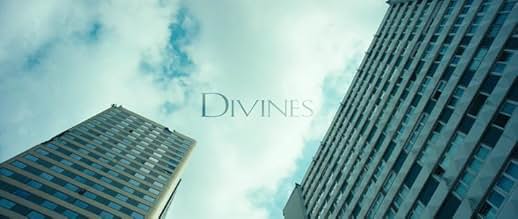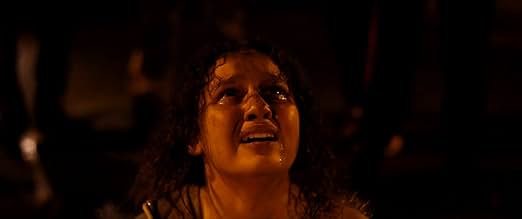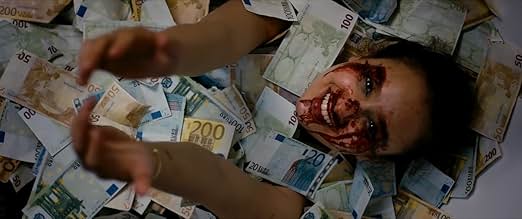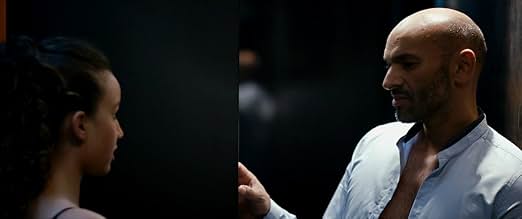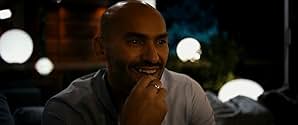Divines
- 2016
- 1h 45min
VALUTAZIONE IMDb
7,3/10
10.857
LA TUA VALUTAZIONE
Un'adolescente di strada di una famiglia disfunzionale di una banlieue a Parigi, si imbatte in una giovane ballerina che stravolge la sua vita.Un'adolescente di strada di una famiglia disfunzionale di una banlieue a Parigi, si imbatte in una giovane ballerina che stravolge la sua vita.Un'adolescente di strada di una famiglia disfunzionale di una banlieue a Parigi, si imbatte in una giovane ballerina che stravolge la sua vita.
- Regia
- Sceneggiatura
- Star
- Premi
- 16 vittorie e 13 candidature totali
Kévin Mischel
- Djigui
- (as Kevin Mishel)
Maryama Soumare
- Madame Camara
- (as Mariama Soumaré)
Samir Zrouki
- Gervais
- (as Samir Zbrouki)
Recensioni in evidenza
The lead characterization is raw,pure & beautiful!!! The friendshops, relations & portrayed well. How the choices you make define your path is shown well!!! The dancer works hard to make a different path in life while the girl choses a short cut for quick success but loses the most important person in her life!!! What a direction!!! The lead actress is so powerful in her acting!!!
The director, like the main character, wants success. And she did it. Only by opening the door out not the door in. She got the big prize. And that is about it. The bureaucratic machine has eaten her whole. Don't get me wrong. I hope I am wrong.
I have seen comments about the rush ending. The ending is not rushed. It is a natural consequence. And the whole script is made following a opera or simple drama. Only both classical drama and the opera are the ways white Europeans see as the highest refinement in entertainment. The film was made to please the eyes and the minds of old f*rts that fill the juries and the commissions that are specialized in turning the taxpayer money into alms for those who know how to please.
There are social statements, but they are void and not offensive, like the small exercise in accountancy at the beginning: "how much you make? 1000? The rent is 800. Pay the food and at the end of the month you have nothing." It is true. It is said. Yet it says nothing about the system. Police brutality is never touched. And the final confrontation with the cops is a ballet rehearsal.
I have loved how expressive and full of life Oulaya Amamra can be. But her character has a split personality. In a country where when you can boil an egg on the asphalt the women still wear a bra and two tank tops, she can go to a club with no bra and a generous cleavage. She can in one scene have a hard time coping with the promiscuity of her mother pointing out her decision to fight that, and in another scene go lure a violent man with sex.
In the end there is no story. What does the character want? That's easy. Money. But money to do what? And here is where the director-writer fails. All these are stock characters from television. The youngster with no future. The girls who sell a vagina hoping for the better. The opportunist drug peddler. The unfit mother who god forbid has sex with more than her lawfully given husband and does not read books on parenting. All these are silhouettes on TV. And the story is not on screen but in the white old man's mind, the one who handles the taxpayer money. Sure, there are drugs in the movie. But these are only a device. The stereotype of the easy money. The drugs are not escapism from the ugly world outside, as there is no ugly world outside. The high rise building is only the backdrop to remind the viewer of the 5 o'clock news.
It could have been a 100 minutes story on a budget with only Oulaya Amamra, Déborah Lukumuena and Jisca Kalvanda. Without state money it could have been done precisely a decade ago when the director's association was made. But that association is another way to make a living dancing with the state and tearing the stories apart while moving from place to place to please white old men in power. Of course Cannes wouldn't have looked at such films. But who knows? In that dreamt reality 2016 would have been the production year of a third or even a fourth feature movie on a budget.
Yamina Benguigui has started much better. Stronger films, more accessible stories. And today she is yet another bureaucrat managing other people's money. She has more than one boss and she has to please to receive the money she hands down. Her last work was for TV and that was 7 years ago. And she is not the only one eaten by the machine.
A sad broken story made into a ladder.
Contact me with Questions, Comments or Suggestions ryitfork @ bitmail.ch
I have seen comments about the rush ending. The ending is not rushed. It is a natural consequence. And the whole script is made following a opera or simple drama. Only both classical drama and the opera are the ways white Europeans see as the highest refinement in entertainment. The film was made to please the eyes and the minds of old f*rts that fill the juries and the commissions that are specialized in turning the taxpayer money into alms for those who know how to please.
There are social statements, but they are void and not offensive, like the small exercise in accountancy at the beginning: "how much you make? 1000? The rent is 800. Pay the food and at the end of the month you have nothing." It is true. It is said. Yet it says nothing about the system. Police brutality is never touched. And the final confrontation with the cops is a ballet rehearsal.
I have loved how expressive and full of life Oulaya Amamra can be. But her character has a split personality. In a country where when you can boil an egg on the asphalt the women still wear a bra and two tank tops, she can go to a club with no bra and a generous cleavage. She can in one scene have a hard time coping with the promiscuity of her mother pointing out her decision to fight that, and in another scene go lure a violent man with sex.
In the end there is no story. What does the character want? That's easy. Money. But money to do what? And here is where the director-writer fails. All these are stock characters from television. The youngster with no future. The girls who sell a vagina hoping for the better. The opportunist drug peddler. The unfit mother who god forbid has sex with more than her lawfully given husband and does not read books on parenting. All these are silhouettes on TV. And the story is not on screen but in the white old man's mind, the one who handles the taxpayer money. Sure, there are drugs in the movie. But these are only a device. The stereotype of the easy money. The drugs are not escapism from the ugly world outside, as there is no ugly world outside. The high rise building is only the backdrop to remind the viewer of the 5 o'clock news.
It could have been a 100 minutes story on a budget with only Oulaya Amamra, Déborah Lukumuena and Jisca Kalvanda. Without state money it could have been done precisely a decade ago when the director's association was made. But that association is another way to make a living dancing with the state and tearing the stories apart while moving from place to place to please white old men in power. Of course Cannes wouldn't have looked at such films. But who knows? In that dreamt reality 2016 would have been the production year of a third or even a fourth feature movie on a budget.
Yamina Benguigui has started much better. Stronger films, more accessible stories. And today she is yet another bureaucrat managing other people's money. She has more than one boss and she has to please to receive the money she hands down. Her last work was for TV and that was 7 years ago. And she is not the only one eaten by the machine.
A sad broken story made into a ladder.
Contact me with Questions, Comments or Suggestions ryitfork @ bitmail.ch
Selling drugs, hoping to get rich, stealing, fighting, and romance, there are a lot of movies made on this theme. Nothing new here just a different context and location.
This is one very affecting movie, a type of film that fills you with a sense of real people feeling real emotions --nothing is fake, all the characters and all their needs are as real and painful as it gets. And just as in life, nothing is resolved in a satisfying ending.
The lead actress is one very ambitious young lady, Oulaya Amamra, who will make her mark on cinematic history soon, but you might want to catch her in her early stage to see how she progresses quickly to Meryl Streep (or at least Jennifer Lawrence) status. Her character's name is Dounia, and she is a daughter of the town slut in a Roma (Gypsy) camp.
Her best friend, Maimounia, a black girl, daughter of a Muslim priest, is as lovable as they come. The two of them conspire to become rich. Even though they achieve the goal, it eludes them in a way that is completely unfair, yet realistic. There is no simple resolution, and therefore, the film is just like life: it is completely and utterly unfair.
Although the plot seems simple, it is extremely more complex and a summary of the action doesn't do justice to the story. Dounia has a love-hate relationship with a male dancer that takes too much away from the rest of the film, and the scenes of the dancer are way over long and unnecessary, but thankfully it is the relationship that she has with her best female friend that is the true heart of the film.
To say more would detract from one's enjoyment of the twists and turns that ensue during the course of the film. Rest assured, you will be glad you spent time in the company of the actresses and the female director of this very impressive film.
The lead actress is one very ambitious young lady, Oulaya Amamra, who will make her mark on cinematic history soon, but you might want to catch her in her early stage to see how she progresses quickly to Meryl Streep (or at least Jennifer Lawrence) status. Her character's name is Dounia, and she is a daughter of the town slut in a Roma (Gypsy) camp.
Her best friend, Maimounia, a black girl, daughter of a Muslim priest, is as lovable as they come. The two of them conspire to become rich. Even though they achieve the goal, it eludes them in a way that is completely unfair, yet realistic. There is no simple resolution, and therefore, the film is just like life: it is completely and utterly unfair.
Although the plot seems simple, it is extremely more complex and a summary of the action doesn't do justice to the story. Dounia has a love-hate relationship with a male dancer that takes too much away from the rest of the film, and the scenes of the dancer are way over long and unnecessary, but thankfully it is the relationship that she has with her best female friend that is the true heart of the film.
To say more would detract from one's enjoyment of the twists and turns that ensue during the course of the film. Rest assured, you will be glad you spent time in the company of the actresses and the female director of this very impressive film.
Wow! What I expected to be a medicare classic sentimental a girl-from-the-ghetto story, turned up to be an extraordinary experience of incredibly acted, beautifully complex, unconventionally artistic movie. If this is the director's first feature movie, I am genuinely looking for next one.
The story is about a 15-year-old Muslim girl called Dounia and her black friend Maimouna that both grow up in a poor migrant superb of Paris.They have both different characters and family situation, but they both share their insecurities and hopes with each other openly and you can feel the strength of their influence on each other even when it seems like they paths split.
They are both clueless teenage girls, that feel like they deserve more in life than what they were given by their parents or society. And it's Dounia that is more willing to risk and fight for that better future. The relationship dynamic is fascinating to watch and very well acted. There is also interesting and potentially romantic (?) relationship between Dounia and a guy who is a dancer, and whose artistic aspirations in dancing is confusing her (and her own value system). And what's more, her friend Maimonua doesn't seem to be so impressed with him as Dounia, so she acts very ambiguously toward him and even sees him as weak, even though she is not sure that what she sees as a weakness is actually a weakness after all. This split between her contradictory emotions is amazingly well acted (in my opinion by a rising star) young actress Oulaya Amamra.
The ghetto, lack of meaning, lack of guidance and respected adult authorities, lack of social (economic) opportunities and feeling of being an alien in someone else's society is the true antagonist of the story.
It drives Dounia (and Maimonua follows her in admiration) to make naive and bad choices, but at the same time you feel something very authentic and even admirable in her drive to find the most accessible way out of her frustrating situation. As there seems to be no adult that understands her feelings, she relies on her best friend Maimonua feedback and evaluation of her. But they both can only know, what they can learn from their surrounding culture and significant adults around themselves - who also seem clueless and desperate, so why should Dounia trust them at all? She has an immature drunk mother and no father. So when she drops out of school and start selling drugs, the world looks like it belongs to her (and her best friend), unable to see inevitable consequences of the path she puts herself and their friendship in.
And as the movie progress, you ask yourself how much she can get away with and will she finally learn harsh life lessons on her own or will the unusual relationship with the dancer help her to see beyond distorted values she desperately tries to believe in?
It is a matter of taste, I guess, but a Golden globe nomination, 10 minutes standing ovation and subsequent win at Cannes festival is, in my opinion, well deserved. Besides I read that the "self-thought" director Houda Benyamina herself grew up in the type of suburb she captures in this movie, so you can't accuse her of over-dramatization or stereotyping.
I've seen A Man called Ove (2016) and Toni Erdmann (2016) which are both nominated for 2017 Oscars for foreign movies, but I think Divines deserves it more. I personally, put Divines to my Top 2016 list of movies.
Highly recommend.
The story is about a 15-year-old Muslim girl called Dounia and her black friend Maimouna that both grow up in a poor migrant superb of Paris.They have both different characters and family situation, but they both share their insecurities and hopes with each other openly and you can feel the strength of their influence on each other even when it seems like they paths split.
They are both clueless teenage girls, that feel like they deserve more in life than what they were given by their parents or society. And it's Dounia that is more willing to risk and fight for that better future. The relationship dynamic is fascinating to watch and very well acted. There is also interesting and potentially romantic (?) relationship between Dounia and a guy who is a dancer, and whose artistic aspirations in dancing is confusing her (and her own value system). And what's more, her friend Maimonua doesn't seem to be so impressed with him as Dounia, so she acts very ambiguously toward him and even sees him as weak, even though she is not sure that what she sees as a weakness is actually a weakness after all. This split between her contradictory emotions is amazingly well acted (in my opinion by a rising star) young actress Oulaya Amamra.
The ghetto, lack of meaning, lack of guidance and respected adult authorities, lack of social (economic) opportunities and feeling of being an alien in someone else's society is the true antagonist of the story.
It drives Dounia (and Maimonua follows her in admiration) to make naive and bad choices, but at the same time you feel something very authentic and even admirable in her drive to find the most accessible way out of her frustrating situation. As there seems to be no adult that understands her feelings, she relies on her best friend Maimonua feedback and evaluation of her. But they both can only know, what they can learn from their surrounding culture and significant adults around themselves - who also seem clueless and desperate, so why should Dounia trust them at all? She has an immature drunk mother and no father. So when she drops out of school and start selling drugs, the world looks like it belongs to her (and her best friend), unable to see inevitable consequences of the path she puts herself and their friendship in.
And as the movie progress, you ask yourself how much she can get away with and will she finally learn harsh life lessons on her own or will the unusual relationship with the dancer help her to see beyond distorted values she desperately tries to believe in?
It is a matter of taste, I guess, but a Golden globe nomination, 10 minutes standing ovation and subsequent win at Cannes festival is, in my opinion, well deserved. Besides I read that the "self-thought" director Houda Benyamina herself grew up in the type of suburb she captures in this movie, so you can't accuse her of over-dramatization or stereotyping.
I've seen A Man called Ove (2016) and Toni Erdmann (2016) which are both nominated for 2017 Oscars for foreign movies, but I think Divines deserves it more. I personally, put Divines to my Top 2016 list of movies.
Highly recommend.
Lo sapevi?
- QuizOulaya Amamra is director Houda Benyamina's little sister.
- ConnessioniReferences Hot Fuzz (2007)
- Colonne sonoreNisi dominus, RV 608: Cum Dederit Dilectis Suis
Composed by Antonio Vivaldi
by Jakub Burzynski & La Tempesta
© 2016 Easy Tiger
I più visti
Accedi per valutare e creare un elenco di titoli salvati per ottenere consigli personalizzati
- How long is Divines?Powered by Alexa
Dettagli
Botteghino
- Budget
- 2.440.000 € (previsto)
- Lordo in tutto il mondo
- 2.297.612 USD
- Tempo di esecuzione
- 1h 45min(105 min)
- Colore
- Proporzioni
- 2.35 : 1
Contribuisci a questa pagina
Suggerisci una modifica o aggiungi i contenuti mancanti

![Guarda Bande-annonce [OV]](https://m.media-amazon.com/images/M/MV5BMjVkMzM5YWYtMWU3My00YWUzLTgyNTYtN2I4ZDVmN2EzZDAwXkEyXkFqcGdeQXRyYW5zY29kZS13b3JrZmxvdw@@._V1_QL75_UX500_CR0)
